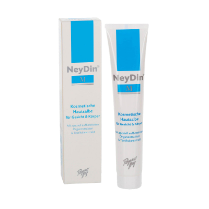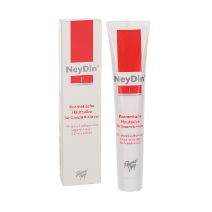
Areas of application / Skin
Skin
The skin, our versatile protective shield and at the same time our aesthetic trademark, is a remarkable organ.
The skin, also known as the integumentum commune, is the largest organ of the human body and fulfills a number of important functions.
It forms a complex protective sheath that protects the body from external environmental influences such as microorganisms, UV radiation and mechanical stress.
The skin also acts as a barrier against the loss of body fluids and regulates the body’s temperature through sweat production and blood vessel circulation.

The skin consists of three main layers: the epidermis, the dermis and the subcutis.
The epidermis consists of a multi-layered, keratinizing squamous epithelium.
It forms the uppermost protective barrier of the skin.
The dermis, also known as the corium, consists of connective tissue that gives the skin stability and elasticity.
The dermis also contains blood vessels and muscles, sebaceous and sweat glands, hair roots and receptors.
The subcutis, also known as the hypodermis, also consists of connective tissue filled with fat cells.
Diseases and symptoms
-
Dermatitis: Inflammatory skin conditions that can cause redness, itching and scaling.
-
Acne: A disease of the sebaceous glands that can lead to pimples, blackheads and inflammation.
-
Eczema: Chronic skin diseases that cause dry, itchy and inflamed patches of skin.
-
Psoriasis: An autoimmune disease that causes silvery, scaly patches of skin and inflammation.
-
Allergic reactions: The skin can react sensitively to certain substances and develop urticaria (skin rash) or contact dermatitis (inflammation on skin contact with allergens).
Care and maintenance of health
-
Sun and UV protection: Effective protection against excessive sun exposure and UV radiation is crucial to prevent skin cancer and premature skin ageing.
Applying sun cream with a sufficient sun protection factor, wearing sun hats and avoiding sunbathing at peak times are important measures. -
Hydration: Adequate fluid intake is important to moisturize the skin and protect it from dehydration.
-
Skin care: Using appropriate skin care products and maintaining a proper skin care routine is crucial to keep the skin healthy.
This may include cleansing, exfoliating and moisturizing the skin. -
Regular examinations: Regular monitoring of moles and skin changes is important to detect skin cancer at an early stage.
-
Skin protection against environmental pollution: Protective measures against environmental factors such as pollutants and allergenic substances are important to avoid skin irritation.
The following content is only visible to specialists. Register now.


NeyDin® M
Intensive care for irritated skin.
Cell extracts from maternal placenta and testes soothe eczema, allergic and inflammatory skin conditions, and are beneficial for swelling and skin hardening.
PZN 6925822

NeyDin® F
Regeneration for problem skin.
Cell extracts from maternal placenta and ovary improve local blood circulation, wound healing and stimulate cell growth.
PZN 6925839

